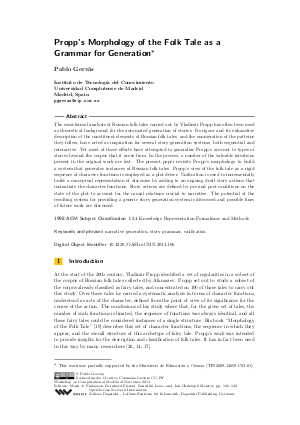Propp's Morphology of the Folk Tale as a Grammar for Generation
Author Pablo Gervás
-
Part of:
Volume:
2013 Workshop on Computational Models of Narrative (CMN 2013)
Part of: Series: Open Access Series in Informatics (OASIcs) - License:
 Creative Commons Attribution 3.0 Unported license
Creative Commons Attribution 3.0 Unported license
- Publication Date: 2013-08-02
File

PDF
OASIcs.CMN.2013.106.pdf
- Filesize: 409 kB
- 17 pages
Document Identifiers
Subject Classification
Keywords
- narrative generation
- story grammar
- unification
Metrics
- Access Statistics
-
Total Accesses (updated on a weekly basis)
0PDF Downloads0Metadata Views
Abstract
The semi-formal analysis of Russian folk tales carried out by Vladimir Propp has often been used as theoretical background for the automated generation of stories. Its rigour and its exhaustive description of the constituent elements of Russian folk tales, and the enumeration of the patterns they follow, have acted as inspiration for several story generation systems, both sequential and interactive. Yet most of these efforts have attempted to generalize Propp’s account to types of stories beyond the corpus that it arose from. In the process, a number of the valuable intuitions present in the original work are lost. The present paper revisits Propp’s morphology to build a system that generates instances of Russian folk tales. Propp’s view of the folk tale as a rigid sequence of character functions is employed as a plot driver. Unification is used to incrementally build a conceptual representation of discourse by adding to an ongoing draft story actions that instantiate the character functions. Story actions are defined by pre and post conditions on the state of the plot to account for the causal relations crucial to narrative. The potential of the resulting system for providing a generic story generation system is discussed and possible lines of future work are discussed.
Cite As Get BibTex
Pablo Gervás. Propp's Morphology of the Folk Tale as a Grammar for Generation. In 2013 Workshop on Computational Models of Narrative. Open Access Series in Informatics (OASIcs), Volume 32, pp. 106-122, Schloss Dagstuhl – Leibniz-Zentrum für Informatik (2013)
https://doi.org/10.4230/OASIcs.CMN.2013.106
BibTex
@InProceedings{gervas:OASIcs.CMN.2013.106,
author = {Gerv\'{a}s, Pablo},
title = {{Propp's Morphology of the Folk Tale as a Grammar for Generation}},
booktitle = {2013 Workshop on Computational Models of Narrative},
pages = {106--122},
series = {Open Access Series in Informatics (OASIcs)},
ISBN = {978-3-939897-57-6},
ISSN = {2190-6807},
year = {2013},
volume = {32},
editor = {Finlayson, Mark A. and Fisseni, Bernhard and L\"{o}we, Benedikt and Meister, Jan Christoph},
publisher = {Schloss Dagstuhl -- Leibniz-Zentrum f{\"u}r Informatik},
address = {Dagstuhl, Germany},
URL = {https://drops.dagstuhl.de/entities/document/10.4230/OASIcs.CMN.2013.106},
URN = {urn:nbn:de:0030-drops-41567},
doi = {10.4230/OASIcs.CMN.2013.106},
annote = {Keywords: narrative generation, story grammar, unification}
}
